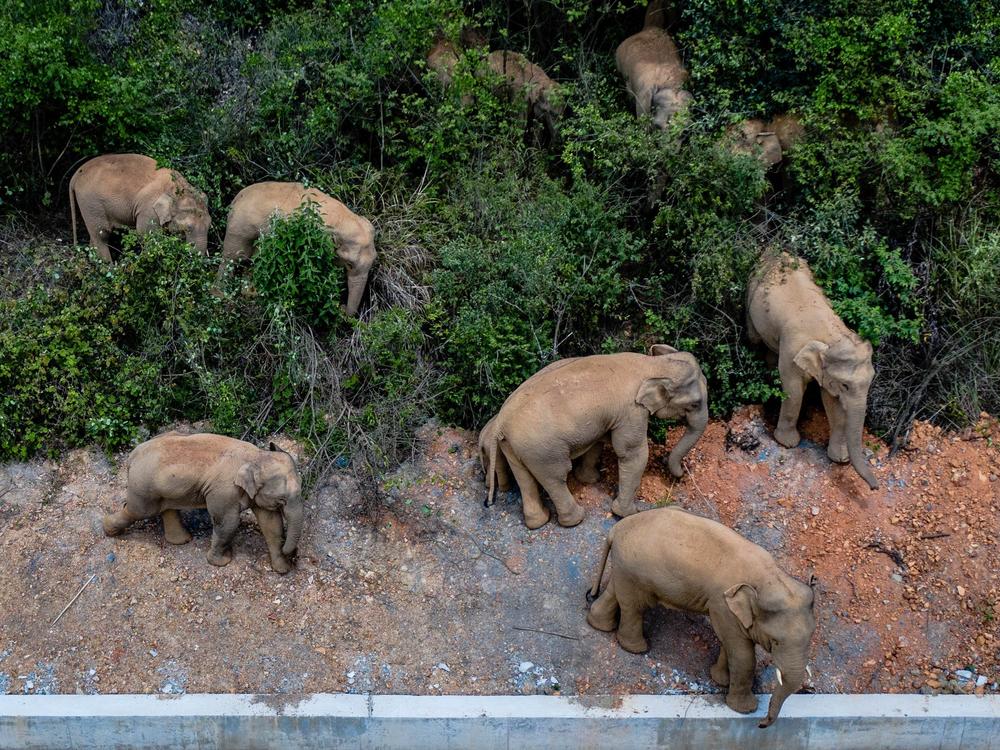Section Branding
Header Content
Elephants Wandered Hundreds Of Miles Into A Chinese City. Nobody Knows Why
Primary Content
A group of wild elephants has wandered into the suburbs of the Chinese city of Kunming after trekking more than 300 miles from their home, perplexing experts and stymying officials who have tried to keep the hulking animals out of populated areas.
The 15 Asian elephants — some mature and others still young — left a nature reserve near China's border with Myanmar and Laos more than a year ago and have been northbound ever since, according to Chinese media.
Along the way, they have traversed forests, forded streams, tromped through villages and towns, broken into farms and raided crop fields. One young elephant was even reported to have become drunk after snarfing down a stash of fermented grain used to make liquor.
Authorities have mobilized hundreds of people and deployed drones to track the group of pachyderms. They've used fruit and vegetables as bait and set up barriers to try to keep the elephants from entering populated areas, including Kunming, which is home to around 7 million people.
But the group has pressed on. The big question is: Why?
Experts suspect they left their home in search of resources.
"We tend to talk about three S's: safety, sustenance and sex," said George Wittemyer, an elephant specialist at Colorado State University and chairman of the scientific board at Save The Elephants.
"(Elephants) move to avoid high risks or to avoid dangerous situations. They move to find food resources, and nutrition and water. And they move for social reasons and reproductive opportunities," Wittemyer said by phone from Kenya, where he is studying African elephants.
In the region of Xishuangbanna, where this group originated, the population of elephants has grown since the government set up two reserves. There are about 280 elephants living there now.
Wittemyer suspects one possible factor may have been elephant overcrowding.
"It's quite natural for elephants when they get in high-density areas to move and search around for better living situations. As you live with a lot of other individuals, there tends to be competition for the best resources," he said.
Human development encroaching on their habitat may have been another big factor, according to Joshua Plotnik, an expert on Asian elephant cognition and behavior at Hunter College in New York. He has been in touch with scientists in China dealing with the wandering herd.
"You know, elephants evolved in a particular habitat. They evolved needing particular resources, and very quickly, over a very short period of time — 50 to 100 years tops — humans have negatively impacted these environments so that the elephants can no longer survive in them," he said.
"And so now they're seeking out other resources and traveling 300 miles to find them."
Why they have kept wandering for so long is also a mystery. Perhaps they haven't found a suitable place to settle down. Perhaps they keep finding treats along the way such as piles of pineapples, bananas and corn, sometimes placed to try to lure them away from people and at other times simply put out by villagers to give the elephants something to eat.
Indeed, the Chinese news outlet Caixin has reported that human-elephant interaction and conflict has been on the rise.
"Elephants have moved further and further away and stayed longer outside the reserves," it quoted Li Zhongyuan, a Xishuangbanna wildlife protection officer, as saying. "Their behavior is becoming more and more unpredictable."
Aside from causing some economic damage, there have not been any major conflicts between this bunch of elephants and people, so far. But the chances of that go up the deeper they wander into populated areas.
"The clock starts ticking when you begin to get negative interactions between the elephants and people," said Plotnik.
There's also probably a limit on how far they can roam.
Chen Mingyong, a professor at the School of Ecology and Environment of Yunnan University, told state TV that if the herd travels any farther north, the habitat will become increasingly unsuitable and they won't be able to survive long.
Meanwhile, the authorities have evacuated some residents and issued warnings to steer clear of the elephants. And scientists are trying to gain a better understanding of their motivations.
The elephants may eventually need to be translocated — put into trucks and moved.
Plotnik says an ideal outcome would be for them to end up someplace where they can be safe and free and where both elephants and humans are protected from each other. Taking them back to Xishuangbanna may be an option, but we need to understand their motivations first, he said.
"If you move them back but you haven't dealt with the reason they left in the first place, they may just leave again," he said. "In fact, I'd be pretty confident they would."
Copyright 2021 NPR. To see more, visit https://www.npr.org.

